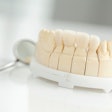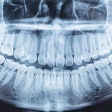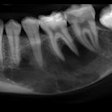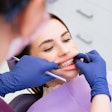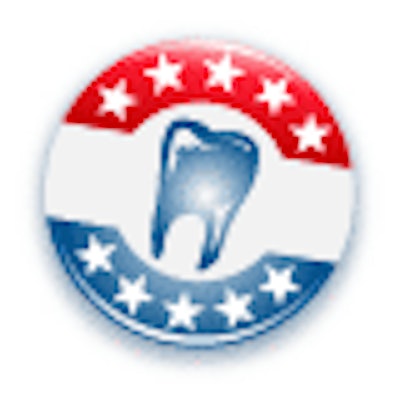
What happens when a member of Congress gets a toothache? Or just needs to get his teeth cleaned? It's handy to know the answer, since at least a couple of the candidates for president promise they would provide the same coverage for all Americans.
"I want to cover dental care," said Sen. Hillary Clinton, D-N.Y., when on the stump in New Hampshire last month, "and in the congressional plan, which I open up to everybody, there are more than 250 plan choices. Most of them cover dental care."
It sounds good. But the comment, which came in response to a question from a hygienist, was a rare one in the primary season so far. Healthcare has loomed large in the campaign, with most of the candidates saying they’ll find insurance for the growing number of Americans who lack it. Some of the candidates have gone so far as to specifically address such disorders as autism. Dental care, by contrast, has barely surfaced.
It’s a yawning omission. For every American lacking general healthcare coverage, there are almost three with no dental coverage. Caries is the most prevalent preventable disease, and after decades of decline, it’s on the rise among small children. Yet even when we approached the candidates’ staffs directly, none could explain how their candidate would address this problem.
That left us to parse their speeches, study their voting records, and query oral health advocates in their home districts to extrapolate what each candidate’s election might mean to the future of dentistry. While we didn’t come up with definitive answers, we found some solid clues. Government-subsidized dental care looks likely to increase if any of the Democratic contenders is elected. Republican Mitt Romney says we can look to his state-organized insurance pools to see what he’d do for the nation. His GOP rivals look more likely to offer healthcare-oriented tax cuts. All the candidates leave unanswered questions about Medicaid reimbursement for dentists.
Hilary Clinton: No new bureaucracy!
Clinton "has lately become much more aware of the value of oral health care," says Jack E. Bresch, the American Dental Education Association's (ADEA) associate executive director and head of legislative policy development. That awareness was on display when she responded to the hygienist’s question. "I'm really glad you [asked] this .... because one of the things we are finding out is all of the connections between dental problems and heart disease, between dental problems and other systemic conditions," said Clinton. "If we don't cover dental care, you're going to miss a lot of the problems that will then get very expensive."
 |
| Hillary Clinton would open up the federal employees dental plans to all Americans. |
She went on to discuss the plight of Diamonte Driver, the Maryland 12-year-old who died from a dental abscess last fall. The child had no health insurance because his mother earned too much money for Medicaid, but too little to afford a private plan. "The hospital incurred $300,000 worth of medical expenses trying to save him, because his mother couldn't get the $60, $70, $80 to pay for a dental visit," Clinton said. "That's the kind of story that underscores the unfairness of the system, but also the importance of covering dental care, and I intend to do everything I can to make that happen."
Barack Obama: Insurance will cost less!
Barack Obama, D-Ill., has likewise shown some knowledge of oral health issues. About a year ago, the ADEA's Bresch met the Illinois senator at a private gathering in Charleston, WV. "He said to me, 'Well, Jack, are you aware that there is a connection between prenatal low-birth weight in babies and periodontal disease?'" Bresch answered affirmatively, adding that he was happy to learn that Obama knew about it, too.
"I think he could be a friend to dentists," says Dave Marsh, director of government relations for the Illinois State Dental Society. "We never used him as our go-to guy when he was in the state senate, because the Republicans were in power when he was elected. [But] when the Democrats achieved a majority and Obama became chair of the Illinois senate's committee on health, he was always very reasonable when working with us."
While in the Illinois legislature, Obama sponsored a bill expanding the State Children's Health Insurance Program (SCHIP) -- which provides healthcare to poor children who don't qualify for Medicaid -- to an additional 70,000 children. The bill passed with bipartisan support.
Like Clinton, Obama says he wants all Americans to have insurance coverage equivalent to what members of Congress get. So what happens when Rep. Somebody needs a cleaning? He picks up the phone and makes an appointment, knowing that the entire tab will likely be covered. Members of Congress, like most federal employees, choose their insurance during an "open season" each November from among a set of policies approved by the Federal Employee Health Benefit Program (FEHBP) in which, Clinton’s Web site notes, "many plans offer dental coverage."
The government contracts with major insurers, such as Aetna, MetLife, and the Government Employees Health Association. The cost of the plans varies depending on the insured’s location. Using the "plan comparison tool" for the ZIP code of DrBicuspid.com’s San Francisco office, we found premiums for dental coverage ranging from about $25 to $42 a month for an individual. All the plans covered "100 percent" of basic preventive services. Their coverage of major services such as root canals, gingivectomy, crowns, and dentures varied from 35 to 50 percent, and most of the plans imposed annual maximums of $1,200.
"If we don't cover dental care, you're going to miss a lot of the problems that will get very expensive." Sen. Hillary Clinton.
Under the big white dome
The contenders for the Democratic nomination say their versions of national health insurance would mean that those who like their current coverage can keep it. The democratic candidates also agree that they’ll provide "universal health care coverage," through a mixture of tax credits, incentives to employers, and expansion of government programs such as Medicare, Medicaid, and the State Children’s Health Insurance Program.
Bresch predicts that if a Democrat takes the White House, there will be a serious move towards nationalized health insurance. "Discussions about healthcare reform will ultimately get to the point where everyone is talking about a basic benefit package," he said. "Our association will be lobbying to make sure oral health care is included."
"Traditionally, dentists have tended to stay out of national health insurance discussions," notes Frank A. Catalanotto, D.M.D., professor of community dentistry and behavioral science at the University of Florida College of Dentistry. "We talk about 'keeping dentistry out of Medicare.'"
Having a Democratic president committed to universal healthcare coverage could signal that it's time to change that thinking, he says. At the very least, it would lead to spirited discussions within the profession, Dr. Catalanotto observed. "I think dental care is something people are concerned about, and if we're going to have a national health insurance plan, it should be in it, which says dentists should be involved in the planning process."
But all this assumes a Democrat will be elected. What would dental care look like under a Republican president?
John McCain: Tradition and tax credits
Republican Sen. John McCain of Arizona calls a federally mandated healthcare plan a "false remedy." The answer to our healthcare troubles, McCain says, lies in reforming the tax code to end the bias toward employer-sponsored health insurance. He favors a tax code shift that would give families a $5,000 credit they put toward health insurance ($2,500 for individuals.) And he would encourage more individuals to band together and buy group insurance. He has not mentioned dental care.
As a senator, McCain recently included dental benefits in legislation he sponsored that expanded the time limits and amount of Veterans Administration care offered to returning soldiers. But he voted against the recent proposed expansion of SCHIP, which Clinton and Obama supported and which would have mandated dental care for those covered.
Mitt Romney: Follow my lead!
Mitt Romney says he’d push the rest of the country to follow the course Massachusetts charted under his leadership. The solution to our healthcare woes, he says, lies in encouraging states to create their own private, market-based insurance coalitions. As for the uninsured, "I'm the guy who tackled the problem." The new Massachusetts plan mandates health insurance and employer participation in providing it. Don't say it out loud, but it has much in common with those of the Democratic contenders.
Dental care is included in Massachusetts's "Commonwealth Care," which covers the cost of insurance for those who earn less than three times the federal poverty level (which would come out to about $63,000 a year for a family of four). Since the plan has only been funded a few months, it's too early to see if the working poor actually are getting more dental treatment. Surprisingly, Romney was a cheerleader for the plan, signed it into law in the spring of 2006, then promptly vetoed most of the benefits, including dentistry. The state legislature restored them. Romney also has been sued as governor, for the state's failure to deliver dental care to children enrolled in Medicaid.
Michael Huckabee: Upside down
Rather than a detailed healthcare plan, former Arkansas governor Michael Huckabee has offered a couple of principles: preventive care and personal responsibility. In debates and stump speeches, Huckabee says that America's healthcare is "upside down" because it focuses money and effort on treating disease and not on prevention. He doesn’t explain how impoverished families would get dental care under his administration.
However, as governor of Arkansas, Huckabee was "a big supporter of healthcare on every level, including dentistry," says Edie Mauldin, executive director of the Arkansas State Dental Association. She says Huckabee spearheaded a collaborative, bipartisan effort to reform the state's version of SCHIP, called ARKids, giving 70,000 more children access to health and dental care.
Grinding forward
Judged by their rhetoric alone, Republicans would address problems in the healthcare system mostly by cutting taxes. These candidates rally crowds by condemning "socialized medicine." However, one of them, Romney, has a history of backing an expanded government role in paying for care. Overall, if the White House stays Republican, Bresch thinks little would change in the dental care delivery system.
None of the candidates -- for either major party -- have said how they would grapple with the Diamonte question: many dentists won’t take Medicaid patients because the plan reimburses them way below what they normally charge. It would be nice to know if these candidates would push for increased reimbursement for dental care. If so, by how much? If not, how will they help people like Diamonte?
The mixed records and enigmatic platforms of these candidates may leave dentists, patients, and other oral healthcare advocates grinding their teeth. But veteran politicos say it’s business as usual on the campaign trail. "I'd be really surprised if they were very specific at this stage," says William Prentice, director of the ADA’s Washington office. "And you also have to remember that candidates tend to offer grand ideas, but then run into trouble when they have to explain how they will pay for them."
Prentice feels that, despite platforms and promises, there is "no real basis right now" for saying whether any of the candidates will address the burning issues in dentistry.
Perhaps that’s why, for the time being anyway, the top dental contributors are splitting their money more evenly between the two parties than in the past two election cycles, when giving was strongly skewed toward the GOP. According to the non-partisan Center for Responsive Politics, which collects and analyzes Federal Election Commission reports, so far the ADA has given 48 percent to democrats and 52 percent to republicans. Among dental organizations, trade groups, and dentists, the ADA has donated the biggest chunk of change to date, some $714,500.
Next in giving was the $94,000 contributed by the American Association of Oral and Maxillofacial Surgeons, whose money was split 49 percent to Democrats and 51 percent to Republicans. After that, the giving comes down on one side or the other. The American Association of Orthodontists gave 82 percent of their $54,500 to the GOP's candidates and 18 percent to Democrats. The American Academy of Pediatric Dentistry leaned just the opposite way, with 62 percent of its $13,000 in gifts going to Democrats and 38 percent to Republicans.
Will the investment pay off in a better future for dentistry? For the answer to that question -- and a lot of others -- we’ll have to wait at least another year.









